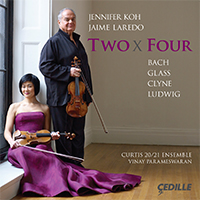
Available from Cedille Records
Classical Candor
By John J. Puccio
June 25, 2014
original
link
Music by Bach, Clyne, Glass, and Ludwig. Jennifer Koh and Jaime Laredo, violins; Vinay Parameswaran, Curtis 20/21 Ensemble. Cedille Records CDR 90000 146.
Some things new; some things old. The new would be violinist Jennifer Koh and double violin concertos by Anna Clyne and David Ludwig. The old (or, at least, older) would be violinist Jaime Laredo and double concertos by J.S. Bach and Philip Glass. The combination works wonderfully together.
The folks at classical WCLV Cleveland write of the disc: "Three great conservatories (two in Northeast Ohio) are represented on this new disc: Jennifer Koh is an Oberlin alum, Jaime Laredo teaches at the Cleveland Institute of Music and at Philadelphia's Curtis Institute. This project has been in the works since 2010, when Jennifer Koh approached composers Anna Clyne and David Ludwig about creating new concertante works for 2 violins, inspired by one of Ms. Koh's favorite works, the Bach Double Concerto which leads off the program. Anna Clyne responded with Prince of Clouds, written specifically for Jennifer Koh and her mentor at Curtis, Jaime Laredo. David Ludwig's Seasons Lost is an artist's response to the reality of global climate change. The fourth composer in "Two x Four" is Philip Glass whose Echorus was written in 1995 for Yehudi Menuhin."
The solo performers are two consummate artists, so you would expect nothing from them but the very best. So they start out with the best, the inspiration for the other works, the Concerto for Two Violins in D minor, BWV 1043 by Johann Sebastian Bach (1685-1750). The violinists shine in their individual right, of course, but their sympathetic communication in Bach (and, indeed, in all the pieces presented here) is evident in every passage. Their partnership is energetic, felicitous, and expressive, admirably and pleasurably so. I especially enjoyed their nuanced playing of the central Largo, which is most impressive in its emotional concentration and its lyric, dance-like qualities.
Next up is Prince of Clouds for two violins and string orchestra by British-born composer Anna Clyne (b. 1980). It's a relatively short piece here recorded for the first time. As in the Bach, the two violinists share complementary roles, intertwining their contributions with grace and finesse. Ms. Clyne says that she imagined the piece as a "dialogue between soloists and ensemble." Certainly, Ms. Koh and Mr. Laredo maintain that musical dialogue in eloquent fashion and through several highly variable mood changes.
After that is Echorus by American composer Philip Glass (b. 1937). Although Glass would rather that people not call him a minimalist, he remains one of the first composers listeners think of when they hear the word "minimalist." Glass currently prefers that people think of him as a classicist in the mold of Bach, Mozart, and Schubert. Fair enough. Furthermore, Glass says his music often features a "repetitive structure," and we hear that in Echorus, the echoes of each refrain. Koh and Laredo shape and caress the music carefully, sweetly, gingerly, creating a performance that encapsulates all that is good about Cage's work. The gently pulsating rhythms of the variations are hauntingly beautiful and produce a lasting impression for the listener.
The final work on the program is Seasons Lost for two violins and string orchestra by American classical composer David Ludwig (1974). Ludwig descends from a roster of famous musicians, including his uncle, pianist Peter Serkin, his grandfather, pianist Rudolf Serkin, and his great-grandfather, violinist Adolf Busch. Yes, he also knows his business; he was born to it. Ludwig notes that the music represents a time before global warming caused the seasons to run together, a time when Winter, Spring, Summer, and Fall, the four movements in his tone poem, had distinct divisional (and tonal) qualities. The piece works as a modern take on Vivaldi's famous music, but does so more sweetly and with a more-subtle shading of colorations. Koh and Laredo do a splendid job pointing up the differing harmonic changes in the piece and emphasizing the composer's poetic musical vision.
Throughout the program the Curtis 20/20 Ensemble play as though a third member of a trio, contributing equally to the proceedings. They are not just a background accompaniment but an integral part of the music, sharing substantially in a most-pleasing outcome.
Producer Judith Sherman, engineer George Blood, and editor Bill Maylone recorded the album for Cedille Records in March 2013 at the Miriam and Robert Gould Rehearsal Hall at the Curtis Institute of Music, Philadelphia, PA. The violins sound well integrated into the complete aural structure rather than being far out in front of the orchestra. Thus, the sonic landscape is quite realistic, just as one might hear from these players live. The solo instruments appear clearly detailed, with a natural sheen on the strings yet without sounding edgy or hard. The orchestral support enjoys a similarly lifelike recording, nicely transparent but never bright or forward. In short, it's excellent sound.
Copyright ©2014 Classical Candor